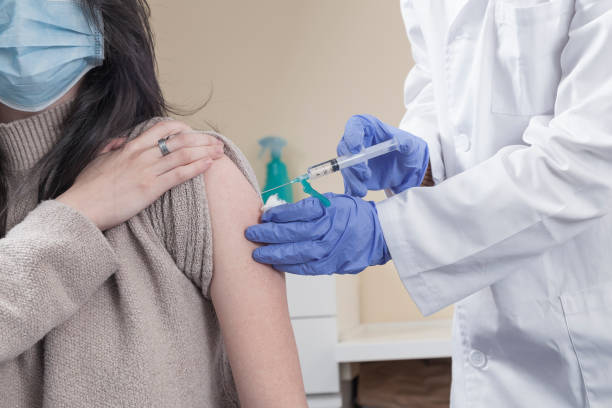Two European observational studies estimate the vaccine effectiveness (VE) of the COVID-19 XBB.1.5 vaccine approved in fall 2023 against hospitalization, the first one finding 49% overall VE in adults, and one showing good protection—but uneven uptake—among pregnant women.
Steep declines in VE after 1 month
For the first study, published in Influenza and Other Respiratory Viruses, researchers with the European Hospital Vaccine Effectiveness Group conducted a test-negative case-control study on the VE against hospitalization of the XBB.1.5 COVID-19 vaccine in the first months of its rollout from October 2023 to January 2024.
The XBB.1.5-like+F456L variant was dominant in Europe from fall to mid-December 2023, when BA.2.86 supplanted it.
The participants were 622 adults hospitalized for COVID-19 and 3,457 control patients admitted for a different severe respiratory infection to 41 hospitals at 7 sites participating in the Vaccine Effectiveness, Burden and Impact Studies (VEBIS) study. In total, 27% of COVID-19 patients and 44% of controls had been vaccinated after fall 2023, most with the Pfizer/BioNTech vaccine.
The median time between vaccination and symptom onset was 58 days for COVID-19 patients and 52 days for controls.
The adapted COVID-19 XBB.1.5 vaccines provided protection against hospitalisation in the first 3.5 months post vaccination, by reducing the risk of COVID-19 hospitalisation by approximately half among the vaccinated individuals.
Overall VE was 49% against hospitalization (range, 69% at 14 to 29 days to 40% at 60 to 105 days postvaccination), although confidence intervals overlapped for all estimates, indicating uncertainty. VE was over 70% in adults ages 65 years and older up to 1 month after vaccination. VE in patients ages 80 and older declined from 76% in the first 29 days to 39% after 60 days.
The study authors noted that their VE estimates are lower than those of three previous European studies but in line with a fourth, except for a greater decline in VE with increasing time since vaccination (TSV), proposing that the differences could be attributed to different TSVs bands.
"The findings of our study suggest that the adapted COVID-19 XBB.1.5 vaccines provided protection against hospitalisation in the first 3.5 months post vaccination, by reducing the risk of COVID-19 hospitalisation by approximately half among the vaccinated individuals," they concluded.
Uptake highest in those with chronic conditions
The second case-control study, published in Vaccine, included all 47,046 pregnancies ending from June 2021 to August 2022 among 39,213 women seen at Northwest London general practices. In 57% of pregnancies, the mother had received at least one dose of COVID-19 vaccine during their pregnancy, with 91% of them receiving a second dose.
Pregnant women, the study authors noted, are at higher risk of COVID-19 complications such as hospitalization, intensive care unit admission, invasive mechanical ventilation, and death.
"They are also at increased risk of pregnancy-related complications such as preeclampsia and emergency cesarean delivery, and their infants are at higher risk of being preterm or stillborn," they wrote, adding that uptake has been suboptimal.
Most pregnancies (80%) were among women aged 25 to 39 years, those who were White (39%) or Asian (34%), and those living in areas in the second (35%) or third (29%) most deprived quintiles of socioeconomic deprivation. The most common of the five risk factors studied was asthma (9.9%), and chronic heart disease was the least common (0.68%).
A total of 180 women were hospitalized for COVID-19. Admission for COVID-19 was much less likely among vaccinated women than among the unvaccinated. A conditional logistic regression model suggested a five-fold decrease in the chances of COVID-19 hospitalization in vaccinated women, compared with their unvaccinated peers (odds ratio [OR], 0.22).
Future vaccination programmes should engage pregnant women earlier and communicate with them clearly and carefully.
Vaccine uptake was lowest in women ages 18 to 24 years (33%), Black women compared with White (37%; OR, 0.55), and those in socioeconomically deprived areas (50%). Coverage was higher among women with chronic conditions, with the greatest uptake among those with chronic heart disease (75% for first dose, 94% for second).
Among women with chronic conditions, women with asthma (OR, 1.20), chronic heart disease (OR, 2.34), diabetes (OR, 1.54), and morbid obesity (OR, 1.15) had significantly higher odds of receiving at least one vaccine dose during pregnancy, compared with those without the condition.
The probability of receiving a first dose of the vaccine was nearly six times higher in the 45- to 49-year) age group than in those ages 25 to 29, compared with 18- to 24-year-olds.
Second-dose patterns were similar. Hospitalized women were much less likely to have been vaccinated than those not hospitalized (22% vs 57%; OR, 0.22). "This association reinforces evidence on the real-world effectiveness of COVID-19 vaccines in preventing severe disease and consequent hospital admission among pregnant women," the researchers wrote.
"COVID-19 vaccine uptake among pregnant women is suboptimal, particularly in younger women, Black women, and women in more deprived areas," they added. "Interventions should focus on increasing uptake in these groups to improve health outcomes and reduce health inequalities. Future vaccination programmes should engage pregnant women earlier and communicate with them clearly and carefully."




















